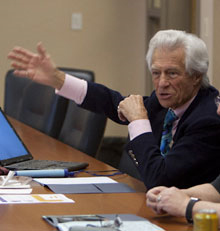World Water Summit draws attention to water's pivotal role
Water and sanitation are at the nexus of Rotary’s six areas of focus, says Ron Denham, of the Rotary Club of Toronto Eglinton, Ont., Canada.
“Without water, we’ll never have conflict resolution. Without water, we’ll never have basic education and literacy,” he explains. Denham, who has served as chair of the Water and Sanitation Rotarian Action Group (WASRAG) since its founding in 2007, is stepping down from his post at the end of this month.
On 21 June, he’ll speak at the group’s fifth World Water Summit, in Lisbon, Portugal. The Rotarian caught up with Denham recently for a conversation about water and sanitation.
THE ROTARIAN: You recently got back from Uganda. What were you doing there?
DENHAM: In Uganda, all 74 Rotary clubs have come together as part of one water program. It’s the first time this has happened anywhere. The program was launched by the Ugandan minister of water and environment a year and a half ago. It’s going to transform the country.
TR: What has changed to make such a program possible?
DENHAM: Traditionally, Rotary clubs have thought about small projects. The project might be building a borehole, digging a well, putting in a pipeline. When they’ve done that, they say, “Now we’re finished.” The problem is that many of those applications have been unsustainable, because there’s no emphasis on behavioral change. There’s no emphasis on working with people in the community so they can sustain the systems themselves. So when the Rotarians in Uganda decided they wanted to make a significant impact, I said, “Let’s stop talking about small projects. Let’s think big.” Getting water and sanitation is not an end in itself – it’s the means to an end.
TR: You have a PhD in mechanical engineering. How did you get so deep into water?
DENHAM: I was senior partner at a Canadian management consulting firm. Most of our projects in the developing world were rooted in access to water. One project, at Lake Manzala in Egypt, was based on aquaculture and agriculture. In Greece, there was one in the horticultural business, which, again, depends on water. I realized what the impact of water could be. In 2004, incoming RI President Glenn Estess asked me to lead a task force on water. Then in 2007, we formed WASRAG.
TR: Why join WASRAG?
DENHAM: To engage in discussions about how to ensure your project is sustainable. We will help you promote your project among other clubs and find funding. The exchange of information is important. For example, people in many parts of the world are making bio-sand filters and helping communities use them, but the practices are slightly different. On the website, we have a forum where users can share their experiences and learn from one another.
TR: Your term ends this year. What happens next for WASRAG, and for you?
DENHAM: [Past RI President] Bill Boyd is taking over as chair, which is fantastic. He’s probably one of the most highly regarded Rotarians there is, and he’s very enthusiastic about water. As for me, I told Bill that I will do whatever he wants me to do. I don’t think I’m going to retire quietly. My wife wouldn’t tolerate that.
- Learn more about the World Water Summit
Download the website sponsorship guide



